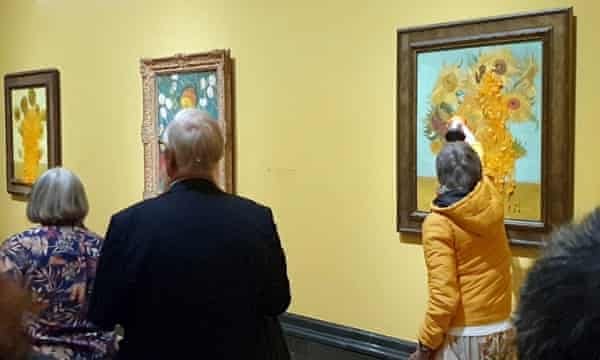Last week, my visit to the National Gallery took a surprising and rather unsettling turn. What was meant to be a calm and enriching afternoon spent admiring the works of the great masters was interrupted by an act of protest that left many visitors in shock. Just Stop Oil, a UK-based activist group, disrupted the tranquillity by throwing soup at one of Vincent van Gogh's most iconic pieces, Sunflowers. This event not only halted my visit for nearly two hours but also raised important questions about the balance between activism and respect for cultural heritage.
Who Are Just Stop Oil?
Just Stop Oil is a grassroots environmental group committed to stopping new fossil fuel projects in the UK. The group primarily focuses on opposing new oil, gas, and coal developments, which they argue are major contributors to climate change. Their aim is clear: to demand the government halt the issuance of new licences and approvals for the exploration and development of fossil fuel infrastructure.
The activists believe that urgent, radical action is necessary to avert catastrophic climate change. Their tactics, however, have become a topic of heated debate. From blocking roads to disrupting public events, their actions often provoke strong reactions from both supporters and critics. The incident at the National Gallery is a stark example of their controversial approach.
My Experience: A Disrupted Afternoon
As a visitor on that day, I was shocked and disappointed by the disruption. The gallery had to close the room containing the Sunflowers for an extended period, and visitors were asked to wait while the area was secured and cleaned. What was meant to be an enriching cultural experience became a waiting game, as I found myself caught in the middle of a protest I hadn't anticipated.
The gallery staff handled the situation as professionally as possible, but the atmosphere had already shifted from one of quiet admiration to one of tension and confusion. The painting, fortunately protected by a glass case, was not damaged, but the impact on the public’s mood was palpable.
Art and Activism: A Delicate Balance
Climate change is undeniably one of the most pressing issues of our time. From rising global temperatures to extreme weather events, the evidence is clear, and we must act. Yet, as important as the message may be, the method of delivering that message matters just as much.
Protesting by targeting art, especially works as priceless and culturally significant as van Gogh’s Sunflowers, feels misdirected. Art is a universal language, transcending time and place. It connects us to our shared history and offers insight into the human condition. To damage—or even risk damaging—such works is not only counterproductive but also disrespectful to the legacy of the artists and the institutions that preserve these treasures for future generations.
The act of throwing soup on a painting might draw attention, but does it inspire constructive dialogue? Or does it merely alienate those who would otherwise be sympathetic to the cause? In this case, it seemed to do the latter.
Finding a Better Way Forward
While I fully support the idea of protecting our planet for future generations, I believe that disruptive and destructive protests are not the way forward. There are countless ways to raise awareness about climate change that don't involve jeopardising cultural landmarks or causing distress to others. Public demonstrations, educational campaigns, community engagement, and lobbying policymakers are all viable, constructive options.
Activism should strive to bring people together rather than drive them apart. Polarising tactics, especially those that alienate large segments of the population, may inadvertently weaken the movement’s cause. We must remember that the fight against climate change is not a fight against art, culture, or individuals. It is a collective effort that requires all of us to work together, with respect for both the planet and each other.
My Takeaway
As I reflect on that day, I find myself torn. On the one hand, I recognise the desperation and urgency behind Just Stop Oil’s actions. On the other hand, I can't help but feel that targeting a beloved work of art was a misguided choice. Art has the power to inspire and heal, to unite us in shared admiration. To co-opt it as a vehicle for protest risks undermining both the cause and the culture we seek to protect.
In the end, I hope that the activists behind these protests will reconsider their tactics and find more constructive ways to advocate for environmental justice. We are all stakeholders in the future of our planet, and together, we can make meaningful change without compromising the legacy of our past.
*The photo was downloaded from The Guardian.
https://www.theguardian.com/environment/2024/sep/27/just-stop-oil-activist-phoebe-plummer-jailed-throwing-soup-van-gogh-sunflowers

